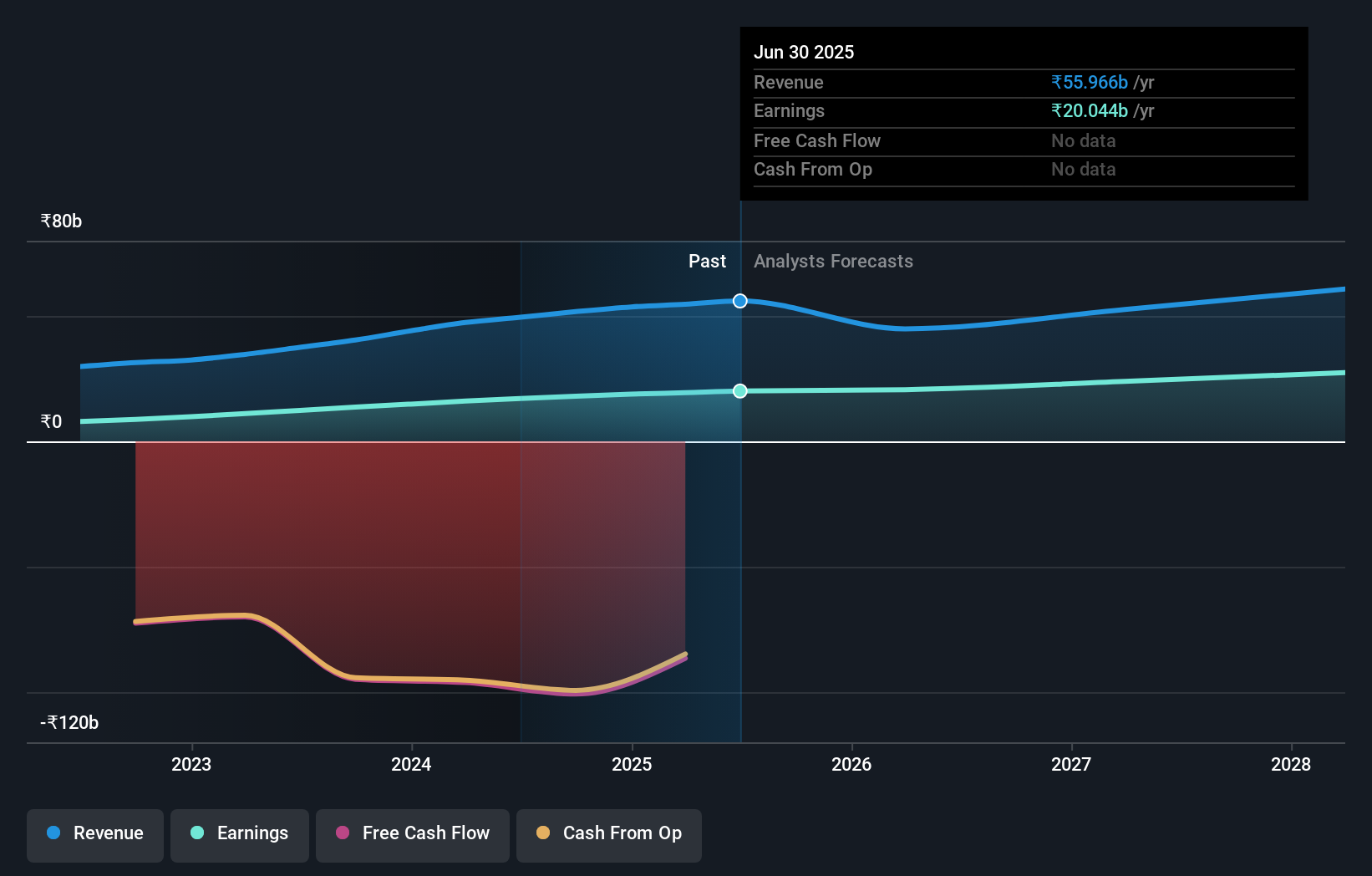retail investors who own 48% along with institutions invested in The Karur Vysya Bank Limited (NSE:KARURVYSYA) saw increase in their holdings value last week
Key Insights
- Karur Vysya Bank's significant retail investors ownership suggests that the key decisions are influenced by shareholders from the larger public
- 46% of the business is held by the top 25 shareholders
- 46% of Karur Vysya Bank is held by Institutions
Every investor in The Karur Vysya Bank Limited (NSE:KARURVYSYA) should be aware of the most powerful shareholder groups. The group holding the most number of shares in the company, around 48% to be precise, is retail investors. That is, the group stands to benefit the most if the stock rises (or lose the most if there is a downturn).
While retail investors were the group that benefitted the most from last week’s ₹9.0b market cap gain, institutions too had a 46% share in those profits.
Let's take a closer look to see what the different types of shareholders can tell us about Karur Vysya Bank.
See our latest analysis for Karur Vysya Bank

What Does The Institutional Ownership Tell Us About Karur Vysya Bank?
Institutional investors commonly compare their own returns to the returns of a commonly followed index. So they generally do consider buying larger companies that are included in the relevant benchmark index.
Karur Vysya Bank already has institutions on the share registry. Indeed, they own a respectable stake in the company. This implies the analysts working for those institutions have looked at the stock and they like it. But just like anyone else, they could be wrong. It is not uncommon to see a big share price drop if two large institutional investors try to sell out of a stock at the same time. So it is worth checking the past earnings trajectory of Karur Vysya Bank, (below). Of course, keep in mind that there are other factors to consider, too.

Karur Vysya Bank is not owned by hedge funds. Our data shows that HDFC Asset Management Company Limited is the largest shareholder with 7.1% of shares outstanding. HSBC Global Asset Management (UK) Limited is the second largest shareholder owning 4.3% of common stock, and Rekha Jhunjhunwala holds about 4.2% of the company stock.
Our studies suggest that the top 25 shareholders collectively control less than half of the company's shares, meaning that the company's shares are widely disseminated and there is no dominant shareholder.
While studying institutional ownership for a company can add value to your research, it is also a good practice to research analyst recommendations to get a deeper understand of a stock's expected performance. There are a reasonable number of analysts covering the stock, so it might be useful to find out their aggregate view on the future.
Insider Ownership Of Karur Vysya Bank
While the precise definition of an insider can be subjective, almost everyone considers board members to be insiders. Management ultimately answers to the board. However, it is not uncommon for managers to be executive board members, especially if they are a founder or the CEO.
I generally consider insider ownership to be a good thing. However, on some occasions it makes it more difficult for other shareholders to hold the board accountable for decisions.
We can see that insiders own shares in The Karur Vysya Bank Limited. This is a big company, so it is good to see this level of alignment. Insiders own ₹11b worth of shares (at current prices). It is good to see this level of investment by insiders. You can check here to see if those insiders have been buying recently.
General Public Ownership
With a 48% ownership, the general public, mostly comprising of individual investors, have some degree of sway over Karur Vysya Bank. This size of ownership, while considerable, may not be enough to change company policy if the decision is not in sync with other large shareholders.
Next Steps:
It's always worth thinking about the different groups who own shares in a company. But to understand Karur Vysya Bank better, we need to consider many other factors. Case in point: We've spotted 1 warning sign for Karur Vysya Bank you should be aware of.
If you are like me, you may want to think about whether this company will grow or shrink. Luckily, you can check this free report showing analyst forecasts for its future.
NB: Figures in this article are calculated using data from the last twelve months, which refer to the 12-month period ending on the last date of the month the financial statement is dated. This may not be consistent with full year annual report figures.
Valuation is complex, but we're here to simplify it.
Discover if Karur Vysya Bank might be undervalued or overvalued with our detailed analysis, featuring fair value estimates, potential risks, dividends, insider trades, and its financial condition.
Access Free AnalysisHave feedback on this article? Concerned about the content? Get in touch with us directly. Alternatively, email editorial-team (at) simplywallst.com.
This article by Simply Wall St is general in nature. We provide commentary based on historical data and analyst forecasts only using an unbiased methodology and our articles are not intended to be financial advice. It does not constitute a recommendation to buy or sell any stock, and does not take account of your objectives, or your financial situation. We aim to bring you long-term focused analysis driven by fundamental data. Note that our analysis may not factor in the latest price-sensitive company announcements or qualitative material. Simply Wall St has no position in any stocks mentioned.
About NSEI:KARURVYSYA
Karur Vysya Bank
Provides various banking and financial services for personal and corporate customers in India.
Excellent balance sheet with proven track record and pays a dividend.
Similar Companies
Market Insights
Community Narratives



